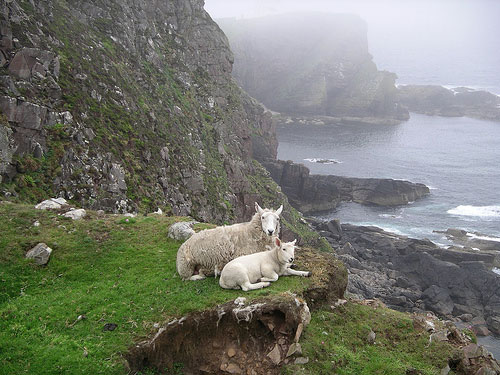The Council announced last Wednesday (October 23) that a political agreement had been reached with the Parliament on the transition measures for agriculture in 2014. This follows the publication of the Commission proposal in April and the adoption of the COMAGRI position in September (the relevant documents are available here in the European Parliament Legislative Observatory)
For direct payments and rural development, the new CAP rules will start to apply as from 1 January 2015. Council and Parliament agreed in June to postpone the implementation of the new rules on direct payments until 1 January 2015, but this seems to be the first time that the institutions have agreed that the start of rural development programmes should be pushed back to 1 January 2015.… Read the rest
Comparing support levels across countries
In the previous post I presented two tables showing Pillar 1 and Pillar 2 payments per hectare by member state which were prepared by the Scottish Executive in support of its campaign to get a higher share of the UK CAP direct payments national ceiling. My focus was on the general story which the tables told on how payments per hectare are distributed across member states, but the tables also show the comparable figures for Scotland as if it were a member state. They show that Scotland expects to be at the bottom of the EU league in terms of Pillar 1 and Pillar 2 payments per hectare by the end of the next MFF period.… Read the rest
Life after Bali for the WTO Doha Round
Some weeks ago I discussed the prospects for a Doha Round mini-package at the next WTO Ministerial Council meeting in Bali in December, and I explained the proposals making up the agricultural elements of that mini-package. A recent paper produced jointly by the Geneva-based International Centre for Trade and Sustainable Development (ICTSD) and the Food and Agriculture Organization (FAO) also provides a useful introduction to the agricultural issues at stake in the Bali talks.
Since then, the Chair of the agricultural negotiations has provided a status update on the progress towards agreement on this mini-package. It makes for tortuous reading as the negotiators get into mind-numbing detail on aspects of the proposals.… Read the rest
The distribution of CAP payments by member state
The Scottish Government is currently waging a campaign for a higher share of the UK national envelopes for Pillar 1 and Pillar 2 of the CAP. It claims that Scotland is almost certain to find itself at the bottom of the EU per hectare league table in terms of both Pillar 1 and Pillar 2 support by the end of the next CAP period because, as a region, it could not directly benefit from the ‘external convergence’ formula used to increase payments in those countries with currently low payments per hectare.
As part of its campaign, the Scottish Government has prepared two tables showing the levels of payment per hectare for both Pillar 1 and Pillar 2 in each member state currently and on average over the 2014-2020 MFF period to bolster its case.… Read the rest
Budget impasse creates uncertainty over December farm payments
All eyes have been focused on the US government shutdown from October 1 through 17 after Congress failed to enact appropriations for the fiscal year 2014, and the simultaneous threat of a US default due to the inability to get a political majority to raise the debt ceiling until Congress finally agreed at the last moment yesterday. Less attention has been paid to the warning given by Financial Programming and Budget Commissioner Lewandowski some weeks ago, and repeated by the Director-General of that Directorate at the European Parliament Budget Committee yesterday, that the EU Commission will find itself unable to pay its bills by the middle of November unless additional appropriations are made available to fund the 2013 budget.… Read the rest
Did we really need the Milk Package?
On 25 September last, the Commission organised a dairy conference in Brussels with 400 stakeholders to discuss the evolution of the EU dairy sector after the end of dairy quotas at the end of March 2015. In his opening speech, Commissioner Ciolos noted that the conference was taking place in a favourable context in terms of the milk market but raised the question whether the market management toolbox now available under the CAP post-2013 proposals is sufficient to enable the sector to adequately anticipate and react to crises in the future.
Commissioner Ciolos referred back to the 2009 milk crisis which led to the establishment of the High Level Expert Group on Milk and ultimately to the introduction of the Milk Package in 2012.… Read the rest

